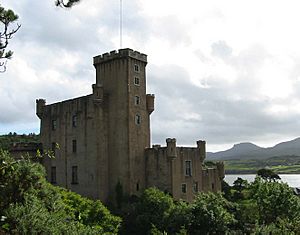Norman MacLeod (British Army officer) facts for kids
Quick facts for kids
Norman Macleod
|
|
|---|---|
| Member of Parliament for Inverness-shire |
|
| In office 1790–1796 |
|
| Preceded by | Lord William Gordon |
| Succeeded by | John Simon Frederick Fraser |
| The 23rd Chief of Clan MacLeod | |
| Preceded by | Norman MacLeod (The Wicked Man) (grandfather) |
| Succeeded by | John Norman MacLeod (son) |
| Personal details | |
| Born | 4 March 1754 |
| Died | 16 April 1801 (aged 47) |
Major-General Norman MacLeod of MacLeod FRS FRSE (born March 4, 1754 – died April 16, 1801) was an important Scottish figure. He was a soldier and a politician. He served as a Member of Parliament (MP) for Inverness-shire from 1790 to 1796. This was a role his grandfather, Norman MacLeod, had also held. People at the time described him as "unusually intelligent." As an MP, he was one of the first to campaign in 1796 to end the slave trade. He was also the 23rd Chief of Clan MacLeod.
Early Life and Becoming a Clan Chief
Norman was born in Brodie House, Moray, Scotland, on March 4, 1754. He spent his first ten years living with his mother in Hampshire, England. During this time, he was taught by private tutors at home. Later, he moved to St Andrews to live with his grandfather. He then studied at the University of St. Andrews in 1769 and 1770. After that, he continued his studies at Oxford in 1770.
In 1771, his family's home, the Dunvegan Castle estate on Skye, faced difficulties. Norman promised to return and help solve these problems.
In 1772, he became the 23rd Chief of Clan MacLeod, taking over from his grandfather. When he returned to Dunvegan Castle, the family's historic home on Skye, he found the estate had significant financial challenges. By 1775, he decided to join the army. He became a captain with the 71st or Fraser's Highlanders.
Military and Political Career
In 1776, Norman sailed with his regiment to America. However, his ship was captured by privateers, which were private ships allowed to attack enemy vessels. He returned home a few years later. He was promoted to major with the 73rd or MacLeod's Highlanders. Soon after, he became a lieutenant-colonel with the 42nd Highlanders. In 1781, he sailed with his battalion towards the Cape of Good Hope. The expedition then continued to India.
He served as a Colonel in the East Indies from 1782 to 1794. He fought against Tipu Sultan and later served in the Malabar region of India. There, he was second in command. In 1794, he reached the rank of Major General.
While returning to Britain in 1790, he was chosen as a Fellow of the Royal Society of Edinburgh. This is a group of important scientists and thinkers. The next year, he was also elected a Fellow of the Royal Society of London.
As a Member of Parliament (MP), Norman MacLeod made important decisions. In February 1792, he voted against going to war with France. In April 1793, he voted to help Scottish Catholics. In 1794, he faced serious accusations regarding his financial dealings during his time in India. These accusations deeply affected him.
Later Life and Family
Due to significant financial difficulties, Norman MacLeod left political life in 1796. He faced personal challenges during this time.
He died on Guernsey on April 16, 1801. He was preparing for a sea trip to improve his health. He left behind some debts.
In April 1776, he married Mary MacKenzie. She was the daughter of William MacKenzie of Suddie. Mary died in February 1784, an event that greatly saddened Norman for the rest of his life. With Mary, he had a daughter named Mary Emilia. They also had a son named Norman (1781-1800). Sadly, his son was killed when HMS Queen Charlotte exploded in Leghorn, Italy.
Later, Norman married Sarah Stackhouse, who was known for her beauty. With Sarah, he had one son, John Norman, and three daughters.
 | Emma Amos |
 | Edward Mitchell Bannister |
 | Larry D. Alexander |
 | Ernie Barnes |


